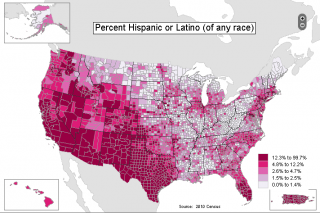Race and Ethnicity
How Millions of Americans Changed Their Race
Lessons about race from the ways people change their census self-descriptions
Posted June 3, 2014

U.S. 2010 Census: Percent Hispanic or Latino (of any race)
Many of my blog pieces, and especially my book The Myth of Race, aim at clarifying confusions about the concept of race. Among the issues I deal with are a lack of knowledge or mistaken beliefs concerning human biological variation, parallel difficulties concerning the cultural meanings of the term race, and especially misunderstandings arising from a failure to distinguish between biology and culture when talking about the subject.
Different cultures have different beliefs about race, so that--for example--many people considered black by Americans would not be considered black by Brazilians, and many people considered white by Brazilians would not be considered white by Americans. In addition, Americans believe that race is something biological that people are born with and cannot change; and for this reason sociologists often refer to it as caste, by analogy with the cultural categories in India. Americans also believe that cultural categories, like ethnicity, are more malleable than racial categories. For example, Americans believe that the children of Brazilian immigrants can be American but do not believe that the children of black immigrants can be white.
Recent United States censuses codify American beliefs about race by using two different questions. One asks specifically about race--presumably a biological category and the other asks about Latin American origin or descent--presumably a cultural category. However, it turns out that millions of Americans changed their self-reported race from the census in 2000 to the one in 2010. Most prominent among them were 1.2 million Americans of “Hispanic, Latino or Spanish origin” who classified their race as other than white in the 2000 census, but relabeled themselves as white in 2010.
One result of the racial relabeling is that we may have to rethink the prediction that the United States will become a majority-minority country by 2043. The prediction is based on the assumption that both the official census categories of race and Americans’ informal cultural categories will remain constant over the next three decades. They have not in the past--for example, Eastern and Southern European immigrants were not considered white when they arrived at the beginning of the last century, but they achieved that cultural status over several decades--so there is no reason to assume that racial categories will remain fixed in the future. If there is one thing we know about culture, it is that it changes over time.
As further analyses of census data continue, it will be interesting to see if there are differences in the rate of racial reclassification among different subgroups, since they have arrived with varying histories of oppression, conquest, and slavery, differing sets of racial categories and beliefs, and differing social class backgrounds.
One thing is certain about the millions whose race changed from one census to the next--they are biologically the same people. What they looked like didn’t change (except for the effects of aging), and neither did their genes or ancestry.
While many people may think that race is a fixed characteristic but ethnicity can change, the census results demonstrate that both are cultural categories, and both can change over time.
Image Source:
Percentage of Hispanic or Latino (of any race), demographic map from US 2010 census using quantile classification bands (equal number of records in each class)
http://commons.wikimedia.org/wiki/File:Percent_Hispanic_or_Latino_(of_a…
Check out my most recent book, The Myth of Race, which debunks common misconceptions, as well as my other books at http://amazon.com/Jefferson-M.-Fish/e/B001H6NFUI
The Myth of Race is available on Amazon http://amzn.to/10ykaRU and Barnes & Noble http://bit.ly/XPbB6E
Friend/Like me on Facebook: http://www.facebook.com/JeffersonFishAuthor
Follow me on Twitter: www.twitter.com/@jeffersonfish
Visit my website: www.jeffersonfish.com


